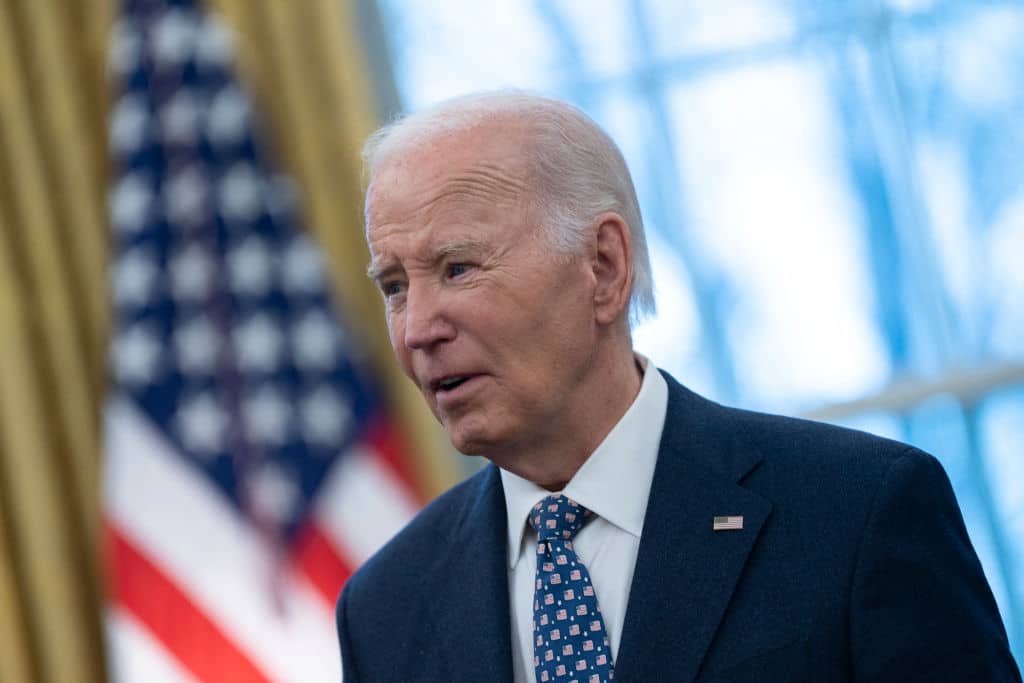President Joe Biden, the 82-year-old outgoing president of the United States, recently commuted most federal death sentences.
The reason for this hasty and far-reaching decision on December 23 to downgrade these sentences to life imprisonment seems to be to prevent President-elect Donald Trump – a longtime advocate for state-sanctioned execution – from ensuring that all these criminals meet their ends at the hands of the government.
After making the decision, Biden commented: “In good conscience, I cannot stand back and let a new administration resume executions.”
Trump was quick to react, <a href="https://truthsocial.com/@realDonaldTrump/posts/113715169361854155"><mark style="background-color:rgba(0, 0, 0, 0)" class="has-inline-color has-vivid-cyan-blue-color">posting</mark></a> on his social media platform, <em>Truth Social</em>, the following: “I refuse to wish a Merry Christmas to those lucky ‘souls,’ but instead will say, GO TO HELL!”
Biden, the US's first Catholic vice president and only its second Catholic president, has drawn criticism from many Catholics in the country for seemingly eschewing Church teaching in his policies, particularly regarding matters of life.
However, in his bold decision to commute these death penalties – whether guided by Catholic teaching or not – he has acted in accordance with Church doctrine. In 2018, the <em>Catechism of the Catholic Church</em> was revised to reflect an evolving understanding of human dignity, stating that "the death penalty is inadmissible because it is an attack on the inviolability and dignity of the person".
The Church has not always been opposed to the death penalty, though, and its use has long been a subject of reasonable debate among Catholics.
Thomas Aquinas, a Doctor of the Church on whom much of its theology stands, was in favour of the State’s right to administer the death penalty. In his <em>Summa Theologica</em>, he writes: “If a man be dangerous and infectious to the community on account of some sin, it is praiseworthy and advantageous that he be killed in order to safeguard the common good.”
However, this is always tempered with mercy, as he also notes in the <em>Summa Theologica</em>: “In judging, we must not seek to slay, but to deliver from death, for Christ came not to destroy souls, but to save them.”
When Pius XII addressed the issue in the mid-20th century, he favoured Aquinas’s approach – perhaps unsurprisingly, as in his 1950 encyclical <em>Humani Generis</em>, he states: “The Church has declared the doctrine of Thomas to be her own.” In a 1954 radio address, he said: “The death penalty, when it serves the common good, is not contrary to the divine law or natural law, but must always respect the dignity of the person and serve the cause of justice.”
Where the Church has spoken in favour of the state’s right to use the death penalty, it has always been coupled with respect for the individual and the hope that they will return to Christ. The person is not condemned in terms of themself, and there remains hope for their salvation.
Indeed, it was Pope Pius XII who canonised Maria Goretti, the Italian virgin martyr stabbed to death at age 11. Present at her canonisation was Alessandro Serenelli, her murderer. Serenelli had repented of his crimes after Goretti appeared to him in a dream while he was in prison, and upon his release, he became a Capuchin lay brother.
The Church demands repentance but abhors resentment and anger. Alessandro Serenelli, repentant and reconciled, is far more in keeping with Pius’s view of justice than Trump’s frustration at not being able to ensure that justice is served through death.
John Paul II’s papacy marked a shift away from the Church’s acceptance of the death penalty when he <a href="https://www.vatican.va/content/john-paul-ii/en/encyclicals/documents/hf_jp-ii_enc_25031995_evangelium-vitae.html"><mark style="background-color:rgba(0, 0, 0, 0)" class="has-inline-color has-vivid-cyan-blue-color">stated</mark></a> in <em>Evangelium Vitae</em> (<em>The Gospel of Life</em>): “Bloodless means are always to be preferred if they are sufficient to defend human lives against an aggressor and to protect public order and the safety of persons.”
By the papacy of Benedict XVI, the Church had become unequivocal on the matter. During a general audience on 30 November 2011, Benedict addressed a group of pilgrims gathered in Rome for an international conference on the topic, <a href="https://archive.santegidio.org/pageID/64/langID/ro/itemID/8704/.html"><mark style="background-color:rgba(0, 0, 0, 0)" class="has-inline-color has-vivid-cyan-blue-color">saying</mark></a>: “I express my hope that your deliberations will encourage the political and legislative initiatives being promoted in a growing number of countries to eliminate the death penalty.”
A quick analysis might suggest that Biden aligns with a more progressive, 21st-century Catholicism, rejecting the perceived authoritarianism of a pre-conciliar Church. However, this interpretation oversimplifies Church teaching and misrepresents history.
Catholic teaching, where it has supported the death penalty, has spoken in favour of the State having the right to execute in certain circumstances, but at the same time not being under a compulsion to do so. Biden by choosing not to, in this instance, is in agreement with current Church teaching on the topic, but equally it does not contradict historical teaching.
Trump, on the other hand, is in clear opposition. His desire for retribution and his outraged anger, telling the criminals to “go to hell!” is out of kilter with both approaches taken by the Church. It neither meets the pragmatic, cautionary approach coupled with the opportunity for repentance that Pius XII and Aquinas favoured, nor complies with the prohibition Pope Francis supports.
While many might lament – and rightfully so – Biden’s track record on matters of life, in this instance he has shown a clear respect for it. By preventing this most un-Catholic action – the vengeful taking of the lives of some three dozen criminals – he stands in agreement with Aquinas, Pius and Francis.
It is a strong finish for this veteran politician and, for once, in keeping with the actions one might expect of a Catholic president.
<a href="https://catholicherald.co.uk/human-dignity-is-no-longer-a-given-in-the-modern-world-its-up-to-the-church-to-protect-it/?swcfpc=1"><mark style="background-color:rgba(0, 0, 0, 0)" class="has-inline-color has-vivid-cyan-blue-color"><em><strong>RELATED: Human dignity is no longer a given in the modern world: the Church must protect it</strong></em></mark></a>
<em>Photo: US President Joe Biden meets Medal of Valour recipients in the Oval Office of the White House in Washington, DC, USA, 3 January 2025. (Photo by CHRIS KLEPONIS/AFP via Getty Images.)</em>



